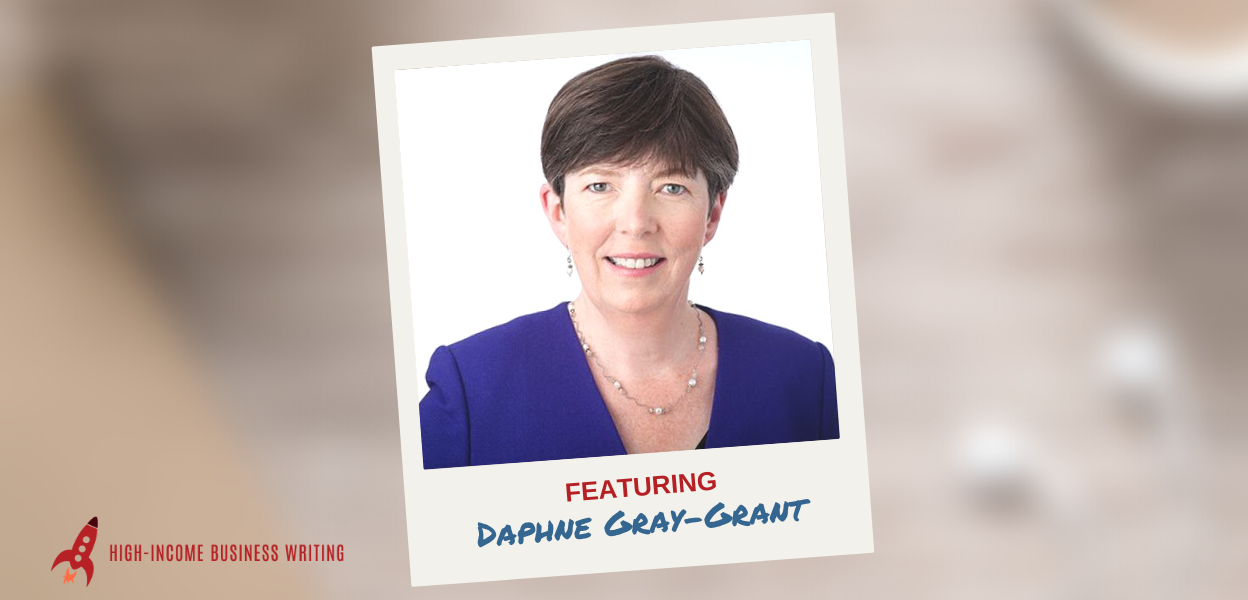Earning more in less time is not just about getting higher fees for your work. It’s also about being more productive and approaching client projects more efficiently.
And a key part of writing productivity is effective editing.
Editing is one of the key phases of any writing assignment. Yet I find that most of us don’t have a step-by-step process for the editing phase. We tend to approach editing in a somewhat haphazard manner. And don’t always know when we’re truly done making the piece as good as it can be.
My guest today is writing coach Daphne Gray-Grant, author of Your Happy First Draft: A Practical and Painless Guide to Obliterating Writer’s Block. Daphne is no stranger to this podcast. She was one of my first guests on the show over 10 years ago, and she came on again in 2019 to discuss strategies for banishing writer’s block.
In this episode, Daphne shares the 5 biggest editing mistakes she sees writers make—and why avoiding them is so important. She shares some really practical strategies and tips for avoiding those mistakes and making your editing much stronger and effective.
The notes that follow are a very basic, unedited summary of the show. There’s a lot more detail in the audio version. You can listen to the show using the audio player below. Or you can subscribe on Apple Podcasts, Spotify, Stitcher, Google Podcasts, Amazon Music or wherever you listen to podcasts.


High-Income Business Writing with Ed Gandia
#333: The 5 Biggest Mistakes Writers Make When They Edit
Key Topics and Bullets:
- Daphne Gray-Grant’s advice to shift focus from the content being edited by going for a walk or doing something different
- Putting oneself in the shoes of the intended audience
- Debating both sides of an argument to foster critical thinking
- Daphne’s agreement with hiring an editor and suggestion of using software for editing
- Common editing mistakes and the importance of having a checklist and standardized operating procedure (SOP)
- Daphne’s course, Masterful Editing, teaching the steps of the editing process
- Utilizing beta readers for valuable feedback on writing quality
- The importance of establishing agreements and expectations with beta readers
- Beta readers focusing on identifying problems rather than suggesting solutions
- Using video apps like Loom for more efficient and effective feedback
- Understanding the difference between developmental editing and copyediting
- The most common mistake writers make by editing while they write
- The importance of giving writing time to incubate before editing
Timestamped Overview:
[01:54] Ed– I think everyone that I talk to just kinda makes it up. They want to pretend they have a system Or some method, but they don’t. And I see the frustration. I know I see it in me. I guess before we get into the material, why don’t you give us a little bit of background, a little bit of the Daphne story just so people who don’t know you, know a little bit about Who you are, what you do, how you got here.
Daphne– Sure. Sure. So my background is from journalism. My parents had a struggling weekly newspaper, and I started working there at a very young age and gained all sorts of experience in writing and editing and managing. And from there, I went on to work for a large Metropolitan Daily Newspaper, And I was a senior editor there for 6 or 7 years, and then I went into management on the business side of the business And worked there for another 4 or 5 years or so, and then I left to have my children. I’m the mother of triplets, and so that was a big deal. And, I didn’t really want to go back to regular work after that, but I was Anxious to have something to do with my brain aside from, you know, holding crying babies, so I started my own business. And I started off by mainly writing and editing for clients, but one of the things I found was that I was one of those people who I was a born editor.
[06:44] Daphne– You’ve done the writing, for goodness sakes. What makes you think that you’re going to be able to put yourself in the mind’s eye of your readers. It’s very, very difficult. You know too much. You don’t know the questions that are gonna pop up in their mind’s eyes because you’re too close to the material. That proximity to what you’re writing about makes it a very, very difficult call for you to be a good editor. And then, of course, the other thing is that when you are editing, you’re really evaluating the quality of what you’ve done. And once you get into the game of judging your quality, that just shuts down the creative centers inside of our brain.
[08:53] Ed– Yes. And it needs incubation time, doesn’t it?
Daphne– It does need incubation time. So, as a kind of a minimum incubation period, I suggest 24 hours because if you edit sooner than that, you can probably recite some of your text back to yourself. That’s so top of mind. If you’re able to start reciting a text back to yourself, one of the things that’ll happen is you’ll miss some really obvious typos because our brains have this kind of autocorrect function in them, and they’re as annoying as our cell phones. They figure out what it is, we want to read, and that’s what we see. We don’t see the mistakes. So, I say 24 hours a minimum time. And for someone who’s working on a long form project like a dissertation or a book, I suggest 6 weeks. Now that usually makes people gasp or think I’m joking, but I’m not joking.
[10:53] Ed– Don’t even go back, you know, move on to chapter 2, etcetera, and then not, and I know we’re gonna talk about the process, but you’re suggesting don’t start editing at that point?
Daphne– What I would say, some people are all fired…eager to start editing. I’m not worried that way. I’m quite content to wait until I finish the book, then I’ll start editing it. But if you’ve got someone who’s really eager to start editing then I would say date your work when you’re writing it, and you can start editing once the material’s 6 weeks old. Now it may take some people more than 6 weeks to write a first chapter. And if that’s the case, then they can go back and start editing the beginning of the 1st chapter as soon as 6 weeks are up. So it’s a little more complicated in terms of managing your time if you do it that way.
[14:09] Ed– Right. Which is the biggest killer. Yeah. Okay. So, and I know I don’t wanna get in the weeds because this is what you teach, and the whole intention wasn’t for you to, you know, walk us down every single part of the process. But at a high level, what does a good process look like?
Daphne– Well, I’d say at a high level, the most important thing that I see people neglecting to pay enough Attention to is that there are fundamentally 2 primary, very different forms of editing. There is what’s called copyediting, sometimes called line editing, and that’s what people tend to think editing is. They don’t think it’s anything else. So copyediting or line editing is all about things like spelling and grammar and word choice, all these kinds of important but small, picky issues. They’re issues generally relating to rules, or to style, but they’re not relating to the content of what you’ve read. And what I found over the years is that many people, when they edit, neglect to address the content issues. They don’t ask themselves questions like, is this what my audience really needs to know? Have I made this interesting enough for my audience? Is everything in the right order? Have I left out any points that would be even more persuasive to my readers? Have I put in too many points? Is everything in the right order? So those content oriented questions, that’s called substantive or developmental editing. And many people just let that go by the boards, particularly the type of people who have left their writing to the last minute.
[16:56] Daphne– Another part of the reason for doing the substantive editing first is not just time management. It’s also that If you are able to take a break after writing, before editing, that is the time where you get the biggest benefit of that break, if you address the content right away because you don’t need to have taken a break to fix spelling mistakes or grammar mistakes or change words. You don’t need a break to deal with that stuff. But to direct the question, is this interesting enough? Have I hit all the main points? Is there anything I’ve left out here? You need some distance from the story, from the writing you’ve done to be able to address those questions. So what happens is once you start editing, you become really familiar with the story again. So that break you take, it has a limited shelf life because once you start reading and rereading the story again, you’re gonna become extra familiar with it right away. So you wanna take the full benefit you can from having taken that break to really address The substance, the content of what you’ve written, and to make sure that you’re presenting the information in a way that’s going to be interesting and useful enough to your readers.
[23:12] Daphne– Well, one of the things I found in, you know, more than 20 years of working with thousands of writers is that many people allow themselves to feel daunted by the task of editing? So it scares them. They think I don’t know how to do this. I don’t know how to make it better. I don’t know when it’s good enough. And I think the point I wanna make to anyone who feels that way Is that you need to understand that every professional writer feels that way all the time. No one is capable of saying whether their writing is any good ever. Even if you’ve taken 6 weeks, you’re still too close to it. The only way you can tell if your writing is good is to get feedback from an outside third party.
[25:08] Daphne– So don’t hold yourself up to some sort of impossible standard. Now one thing that gets some people, when I talk about professional editors, is to say, well, that’s great, but I can’t afford that. Well, if you can’t afford that, that’s fine. You can use beta readers. So these are people, colleagues, friends, coworkers who will read your work for you and respond to it not in the same way an editor would, but they can give you a sense about the quality. They can say, yes. I found this interesting, or, no, I didn’t, or I would have liked it if you told me a little bit more about x y zed rather than a b c. You know, you can get some outside feedback from them, but don’t expect that outside feedback to come from yourself because that’s an impossibility.
[29:10] Daphne– Then the other thing I’d say about beta readers is give them a test before you make any sort of permanent or long standing relationship with them. I have used 12 to 15 beta readers with both of my books, way more than I think was necessary, and I wouldn’t recommend anyone else use that many. But one of the things I found was that people fall into certain categories and not the categories you expect. So some people who I thought would give me really thoughtful and intelligent, substantive feedback gave me none of that, But they caught every freaking typo. It was like, woah. I wouldn’t have expected that from that person. So it is hard to predict what the nature of the comments are going to be from beta readers. So maybe try someone on a one off basis..
[31:25] Ed– I think that’s wonderful advice because if you’re gonna take the time and make commitments to them as well. Yes. Everyone should feel really good about it. I wanted to offer 1 little tip about how you can provide effective and efficient feedback. I love to use Loom, and I know that’s something, you know, you and I have used. So the Loom video app is a great way To, you know, basically, you share the document on the screen, you hit record, and you could walk through the areas where, you know, you see possibilities for improvement, things where you got stumped, etcetera. And it’s kinda like the comments feature, yes. But depending on how you process information and give prefer to give feedback, it’s very efficient way of giving it a 1st pass and talking about 1st impressions.
[35:39] Ed– It takes so much that that’s energy you can expend somewhere else. That takes up more energy than we realize, doesn’t it? You know? I call it tier 1 and tier 2. Right. It’s like support, customer support. They always have tier 1 and tier 2. That’s the least expensive. You know, it’s usually, unfortunately, online or the chat feature, you know, when you’re calling somewhere. But I love that idea because, if I can take that, that’s many times 50% of what I need to fix.
Daphne– Yes. Yes. It is. And, you know, most people find it kind of fun to be responding to software. It’s not as embarrassing as responding to a real live person who might be inclined to say something like, don’t you know you shouldn’t be using so much passive voice? I mean, most editors probably are foolish enough to say something like that, but you you end up feeling self criticized. But if it’s just from a computer, how can you feel criticized by a computer? So the computer tells you this, and you decide what you’re going to do about it. It’s a very easy way to dramatically improve the quality of your writing.
[38:09] Ed– Your brain’s kinda ready for a break. So you have a course on editing that recently came out. Tell us a little bit about that.
Daphne– So I have an online course called Masterful Editing, and it’s a 21 day program designed to teach people the individual steps that they need to go through as part of their own editing process. It’s, it’s taught in a very, what’s the word I want? I guess, controlled and slow, easy to digest way so that you can really learn the various steps you need to take. I don’t use 21 days to suggest, it should take a minimum of 21 days at anything. That’s not true. But I teach each step separately and so that people can really learn how to do it and feel confident in having those skills.
By the way… whenever you’re ready, here are 3 ways I can help you grow your freelance business:
- Grab a free copy of my book.
It’s called Earn More in Less Time: The Proven Mindset, Strategies and Actions to Prosper as a Freelance Writer. The title says it all. ? — Click Here - Join my implementation program and be a case study.
I’m putting together a new implementation group this month. If you’re earning $5k+/month (or the part-time equivalent) from your freelance business … and you’d like to grow your income quickly with better clients … just email me at ed@b2blauncher.com - Work with me privately.
If you’re a 6-figure writer who’s trying to earn more in less time, with less stress, I might be able to help you get there faster than you think. Just email me at ed@b2blauncher.com and put “Breakthrough” in the subject line, and I’ll get back to you with more details.






